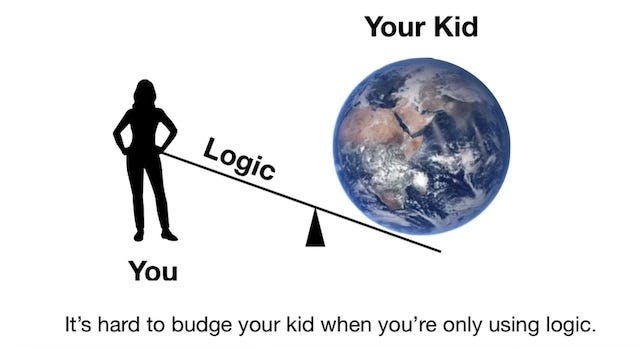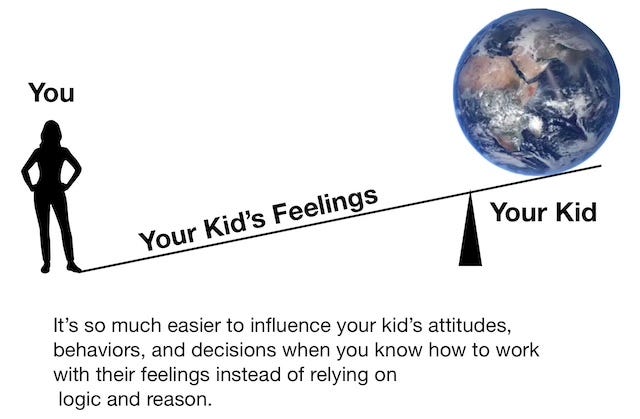Your logical reasoning can't compete with your kid's feelings, which college will she go to? and a Pot-bellied pig.
The Art and Science of Parenting #2
By: Glenn Collins and Catherine Lynch
Dear Awesome Parent,
This is where we answer your parenting questions, inspire you with success stories of parents who have succeeded against incredible odds, and bring you the latest science that pertains to parenting. (And break it down into "regular person" language.) Please join us as we go deeper down the rabbit hole that is all things parenting.
We've been talking about feelings a lot lately. Because…
Feelings matter!
If you’re not interested in your kids’ feelings, you’re missing out on one of the biggest levers you have to influence their attitudes, decisions, and behaviors. It’s not logic and reason that will sway them. In fact:
Your logical reasoning doesn’t mean squat to your kids.
With their less developed brains and fewer years of experience, children are even more motivated by emotion than adults. If you want them to do something, (and we know you do) the easiest way is to get them to feel something. Preferably something that’s predominantly positive.
Feelings are the driving force behind much of our (and our kids’) behavior and decision making. We like to think we make rational and logical decisions, but most of the time that’s not really the case. In fact, a study in 2016 by Zaltman showed that 95% of our thinking occurs in our emotional brain.
Our subconscious mind is constantly scanning, processing, and evaluating the world around us. It has the ability to process 500,000 times more information each second than our conscious mind (Lipton 2015). Though we aren’t consciously aware of this subconscious processing, the results are regularly communicated to our conscious mind via feelings.
In a sense, our feelings are the language our subconscious mind uses to communicate its fears, desires, and conclusions. It’s these very feelings that are the primary motivators of our actions, and our kids are no different. The bottom line is that if you want them to do something, make them feel something.
But not just any feeling! You could use guilt, shame or fear to get the behavior you want in the short term, but it’s like playing dirty pool. You’ll be found out eventually, and it won’t be pretty. There are steep costs to heavy use of these tactics. It sets up unhealthy dynamics in your relationship that can last a lifetime.
Use positive emotions. Set up opportunities, interactions and experiences where your kids will be likely to feel the powerful, positive feelings like belonging, connection, affection and pride. When they feel better, they’ll do better. They’ll be more likely to want to please you, to do what you say, and your relationship with them will be stronger.
Here’s a few of our favorite ways to bring about the positive feelings:
The Power of WE: “Let’s do this together.” This works well for unpleasant things. Especially when combined with empathy. “I know washing dishes is yucky, but it needs to be done. Let’s do it together.”
Relationship: When we care about someone and have or a good relationship with them, we generally want to do the things they ask us to do. The more love, trust, and respect there is, the better this works.
Family Culture: Our family does this/acts this way and you are a valued member of this family.
Agency: When we give our kids the power to make decisions about things that affect their lives, they are more invested in them. It also lets them know that we trust and respect them.
Fun: We all love to have fun! If you can make an activity more fun, your kids will be more likely to be interested. If you can’t figure out how to have fun, ask your kid. They’ll know.
Competition: Whether it’s shooting baskets, who cleans their room the fastest, or who checks the most boxes on the vegetable eating checklist, competition is great for increasing the level of interest and feeling. Just make sure it remains friendly competition, not “you’re a loser and I’m better than you” competition.
This week's parenting story:
We like to think we and our kids are logical beings, but we really make decisions based on feelings. (Sorry for the bad news.) Here’s a short story that illustrates that: A dad we know had a daughter in her senior year of high school. She was accepted into several colleges and narrowed it down to 2 choices: a small private college of good standing, and an Ivy League school. It seemed obvious to everyone that she should choose the Ivy League school, but she wanted to choose the smaller school. (Because: BF)
With a bit of digging, the dad found out that his daughter’s boyfriend would be attending school near the small college his daughter wanted to choose, but far from the Ivy League school. His daughter was making an emotional decision to be near her boyfriend, not the logical decision to attend the more prestigious school that would better serve her future. (You can imagine how the parents felt about that...)
Four years later: They did not live happily ever after. She went to the Ivy League school and broke up with her boyfriend only 2 months into her first semester. She graduated from the Ivy League school and has a great relationship with her parents. Woohoo!
A Baby Pig
Who can resist an opportunity to hold a baby pot-bellied pig? Certainly not me! As you can see, however, the pig wasn't quite as thrilled as I was. He (she?) was quivering so I put him back with his siblings. Because: FEELINGS. I felt bad b/c he was quivering, and I wanted him to feel better. Not in a co-dependent way of You Have To Feel Better, but because I did have the power to change the situation so he felt more at ease. ❤️



